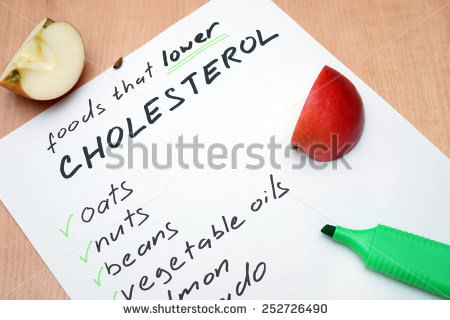Get the App
For Doctors
Login/Sign-up
Last Updated: Jan 31, 2020
BookMark
Report
Take control of your Cholestrol
Dr. Anju VohraHomeopathy Doctor • 32 Years Exp.B.H.M.S ( Mumbai) (Silver Medalist), Certificate In Gyn and Obstetric
Cholesterol is a waxy substance that's found in the fats in your blood. While your body needs cholesterol to continue building healthy cells, having high cholesterol can increase your risk of heart disease.
Cholesterol is carried through your blood, attached to proteins. This combination of proteins and cholesterol is called a lipoprotein. There are different types of Lipoprotein in your blood:
• Low-density lipoprotein (LDL). LDL, or "bad," cholesterol transports cholesterol particles throughout your body. LDL cholesterol builds up in the walls of your arteries, making them hard and narrow causing Atherosclerosis..
• Very-low-density lipoprotein (VLDL). This type of lipoprotein contains the most triglycerides, a type of fat, attached to the proteins in your blood. VLDL cholesterol makes LDL cholesterol larger in size, causing your blood vessels to narrow
• High-density lipoprotein (HDL). HDL, or "good," cholesterol picks up excess cholesterol and takes it back to your liver from where it is excreted.
How to know if you are at risk of High Cholestrol:
• Obesity. Having a body mass index (BMI) of 30 or greater puts you at risk of high cholesterol.
• Large waist circumference. Your risk increases if you are a man with a waist circumference of at least 40 inches (102 centimeters) or a woman with a waist circumference of at least 35 inches (89 centimeters).
• Poor diet. Foods that are high in cholesterol, such as red meat, egg yolk, full-fat dairy products, trans fats, found in some commercially baked cookies, will increase your total cholesterol.
• Lack of exercise. Exercise helps boost your body's HDL "good" cholesterol while lowering your LDL "bad" cholesterol. Not getting enough exercise puts you at risk of high cholesterol.
• Diabetes. High blood sugar contributes to higher LDL cholesterol and lower HDL cholesterol. High blood sugar also damages the lining of your arteries.
• Smoking: Smoking damages the walls of your arteries and also decreases your good cholesterol.
Prevention:
1) Diet: Top foods to lower your cholesterol and protect your heart are:
a) Oats: Oats contain soluble fibre which decreases your LDL (Bad cholesterol)
b) Fatty Fish: Fish has no effect on LDL but eating fatty fish can be heart healthy because of its high levels of omega-3 fatty acids, which can reduce your blood pressure and risk of developing blood clots ,thus preventing Heart attacks.
c) Flaxseed
d) Walnuts, almonds and other tree nuts can improve blood cholesterol. Rich in mono- and polyunsaturated fatty acids, walnuts also help keep blood vessels healthy.
e) Cook in Monounsaturated fat — found in olive, peanut and canola oils .
f) Eat whole grain breads and whole fruits to add fibre to your diet.
2) Exercise: Brisk walk for 30-60 minutes daily.
3) Reduce your weight.
4) Limit your alcohol intake.
5) Quit smoking.
6) Follow a Mediterranean diet which is Heart healthy.
Cholesterol is carried through your blood, attached to proteins. This combination of proteins and cholesterol is called a lipoprotein. There are different types of Lipoprotein in your blood:
• Low-density lipoprotein (LDL). LDL, or "bad," cholesterol transports cholesterol particles throughout your body. LDL cholesterol builds up in the walls of your arteries, making them hard and narrow causing Atherosclerosis..
• Very-low-density lipoprotein (VLDL). This type of lipoprotein contains the most triglycerides, a type of fat, attached to the proteins in your blood. VLDL cholesterol makes LDL cholesterol larger in size, causing your blood vessels to narrow
• High-density lipoprotein (HDL). HDL, or "good," cholesterol picks up excess cholesterol and takes it back to your liver from where it is excreted.
How to know if you are at risk of High Cholestrol:
• Obesity. Having a body mass index (BMI) of 30 or greater puts you at risk of high cholesterol.
• Large waist circumference. Your risk increases if you are a man with a waist circumference of at least 40 inches (102 centimeters) or a woman with a waist circumference of at least 35 inches (89 centimeters).
• Poor diet. Foods that are high in cholesterol, such as red meat, egg yolk, full-fat dairy products, trans fats, found in some commercially baked cookies, will increase your total cholesterol.
• Lack of exercise. Exercise helps boost your body's HDL "good" cholesterol while lowering your LDL "bad" cholesterol. Not getting enough exercise puts you at risk of high cholesterol.
• Diabetes. High blood sugar contributes to higher LDL cholesterol and lower HDL cholesterol. High blood sugar also damages the lining of your arteries.
• Smoking: Smoking damages the walls of your arteries and also decreases your good cholesterol.
Prevention:
1) Diet: Top foods to lower your cholesterol and protect your heart are:
a) Oats: Oats contain soluble fibre which decreases your LDL (Bad cholesterol)
b) Fatty Fish: Fish has no effect on LDL but eating fatty fish can be heart healthy because of its high levels of omega-3 fatty acids, which can reduce your blood pressure and risk of developing blood clots ,thus preventing Heart attacks.
c) Flaxseed
d) Walnuts, almonds and other tree nuts can improve blood cholesterol. Rich in mono- and polyunsaturated fatty acids, walnuts also help keep blood vessels healthy.
e) Cook in Monounsaturated fat — found in olive, peanut and canola oils .
f) Eat whole grain breads and whole fruits to add fibre to your diet.
2) Exercise: Brisk walk for 30-60 minutes daily.
3) Reduce your weight.
4) Limit your alcohol intake.
5) Quit smoking.
6) Follow a Mediterranean diet which is Heart healthy.



+1.svg)
